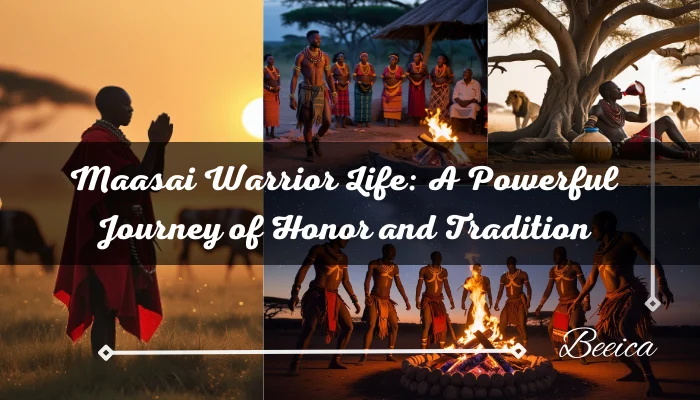At the break of dawn, while the sun was rising to engulf the savannah in its glowing golden rays and morning colors, the Maasai warrior is seen to stir. The sunlight meant to him, not only a lighting agent but also a spirit, a divine messenger that calls him to the duty of caring for the land, the cattle, and the ancestors’ spirits. The Maasai people, a proud race from the well-known Kenyan Mara interpreted in their language as Ilmoran, are not just a people with strong virtues, but they also are the one whose way of life is the result of unbroken and endless ties to the soil, courage, and lofty traditions.
Morning: When the Earth Breathes Awake
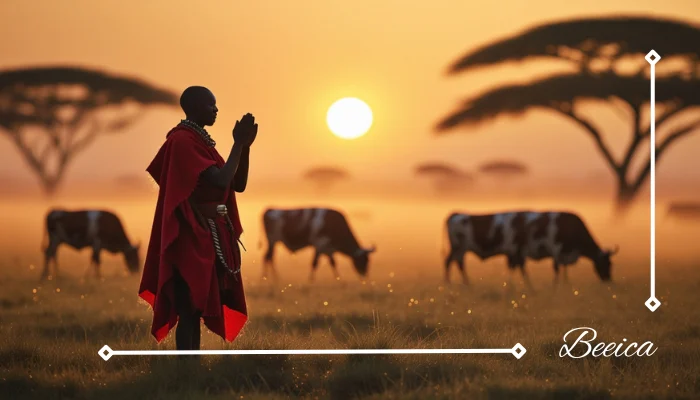
The earth becomes alive and greets a new day by rustling of the grass and the fragrance of the dew falling. The warrior leaves and starts to pray God early in the morning.
He murmurs ‘Enkai nguo ninye’ which is a call to the Supreme Being for strength and wisdom.
In the eyes of the warrior the cattle are not mere animals, they are the river that brings life, the rhythm that drives life forward. A man is nothing without them, a man is like a tree without roots, he is directionless, and his belongings go with the wind. His spear, and his wooden rungu in his hand, the man made his way to the free land where the horizon stretched as wide as an eagle.
The saying of the elders is: “A man without cattle is like a sky without stars.” Therefore, he makes sure that all is well with his cattle as a father would do to his offspring, he is with care that is as deep as the earth.
Midday: Under the Gaze of the Sun
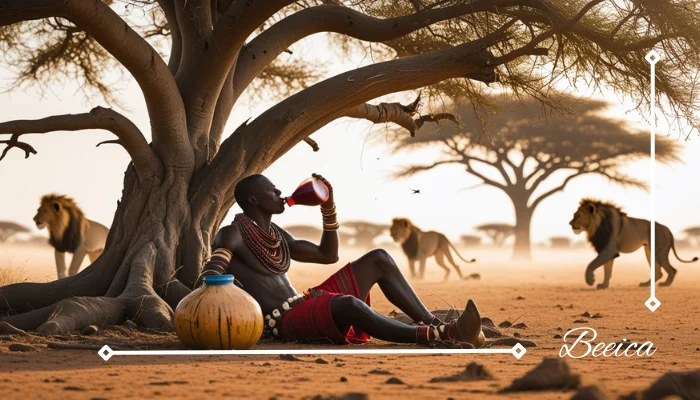
By the time the sun sits high, watching over the land with its unblinking eye, the warrior finds shelter beneath an acacia tree, its twisted limbs holding stories older than memory. From a gourd, he drinks milk mixed with cow’s blood—a gift from the cattle, a drink that carries both strength and life.
The savanna hums around him. The air is full of bird songs, the heat of the day is whirling with insects’ dances and somewhere far away a lion growl sounds like a thunderstorm. Every sound communicates with him, every footmark on the dust is full of stories. He listens, for the land has much to say to those who know how to hear.
Not far off, young warriors test their strength, their laughter ringing through the air like the call of playful wolves. He watches them, seeing his own past in their eager faces. Once, he too was a layoni, learning the ways of the Moran, shaping himself into the warrior he is today.
Afternoon: Returning to the Circle
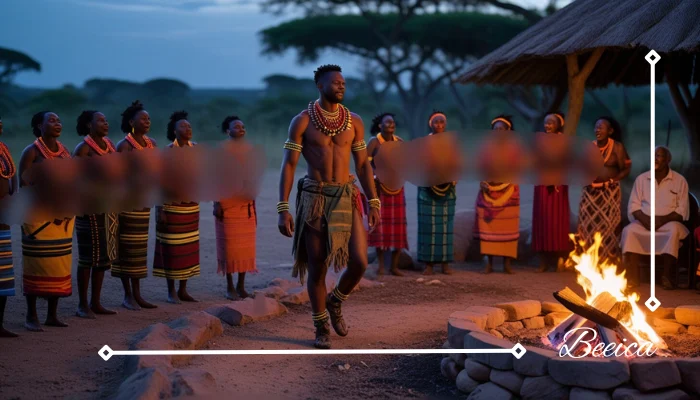
As the sun begins its slow journey home, the warrior walks the familiar path back to his village, where the manyattas stand together like stones in a sacred circle. The women, draped in vibrant beads and shukas, greet him with songs of honor.
“Eroto enkitok,” they sing—praise to the warrior.
The cattle are led into their enclosure, safe from the hunters of the night. The warrior joins the elders by the fire, where words are passed like sacred gifts. They speak of Enkai, the Creator, and the great journey that brought their people to this land. They tell of battles fought with steel and spirit, of wisdom carried on the breath of time.
“The words of the elders are like the roots of a great tree—they hold us steady when the storm comes.”
Evening: The Song of the Warriors
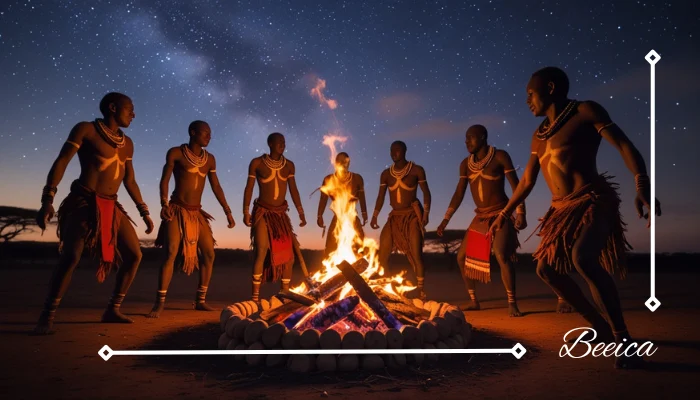
When the sun bows behind the hills, the village awakens with the sound of drums. The warriors gather, their bodies streaked with ochre and ash, their voices rising like the howl of wolves beneath the moon. The adumu begins—the high-jumping dance that is both a challenge and a prayer.
The fire casts their shadows long against the earth. Each leap is a heartbeat, a promise, a connection to the land and the spirits who guide them. Their dance is not for themselves but for their ancestors who came before them and the kids yet unborn.
Night: Below the Canopy of Stars
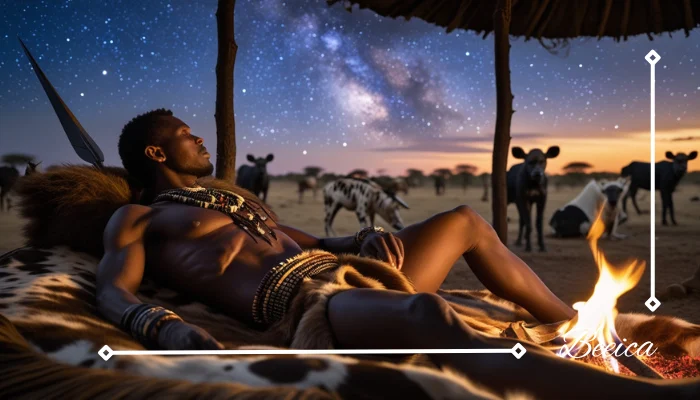
The warrior returns to his manyatta, the warmth of the fire still clinging to his skin. He lies on a bed of cowhide, looking up through the small opening in the roof. The stars stretch endless above him—silent watchers, ancient storytellers.
The night speaks in whispers—the distant cackle of a hyena, the soft rustle of the wind, the steady breath of the cattle. He listens, thinking of the journey ahead. The world is changing, the rivers shifting their course, the winds carrying new voices. But the warrior knows this: the land remains, and as long as his people walk upon it, they will endure.
He will wake up early again tomorrow and respond to the sun.
“The Maasai do not own the land; they belong to it. And in this respect, they draw their strength.”
Reflection
For one to come out as a warrior, the past must go on his back, present in his palms, future in his feelings and thoughts, all at the same time as he walks. Duty and devotion, strength and spirit get together with every step, thereby making the dance: On the one hand, we have the duty, the strength, and the spirit while on the other hand, we are in a relationship of devotion.
The Maasai, like the large trees, sway with the winds of change, and still do not fall. The roots are not weak, the voices are still heard, and it is clear that they are only reminding.
The strength of a warrior does not only lie in his spear—it comes from deep within his spirit, his knowledge, and his inseparable connection with the earth.

Hi, I’m Zara Masood, the creator of Beeica.com—a virtual travel space where I share amazing destinations, travel stories, and tips to inspire your wanderlust.
I’ve always dreamed of exploring the world, but life took a different path. Instead of giving up on my passion, I created Beeica to experience travel in a unique way—through research, imagination, and storytelling. Here, I bring you detailed travel guides, cultural insights, and hidden gems, all from a virtual perspective.
Whether you’re planning a real trip or just love discovering new places, Beeica is here to take you on a journey—no passport needed! 🌍✈️

